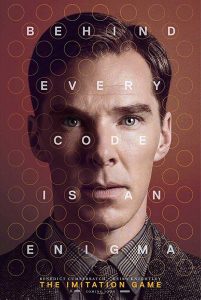Faith & Film: The Imitation Game
 “The Imitation Game” tells the true story of Alan Turing (Benedict Cumberbatch) who successfully breaks the Nazi Enigma Code, contributing greatly to the defeat of Germany in World War II. Turing is recruited as part of a team to break the code in the early part of the war, a task that would take three years to accomplish. “The Imitation Game” is an excellent, absorbing account of the team that broke the code.
“The Imitation Game” tells the true story of Alan Turing (Benedict Cumberbatch) who successfully breaks the Nazi Enigma Code, contributing greatly to the defeat of Germany in World War II. Turing is recruited as part of a team to break the code in the early part of the war, a task that would take three years to accomplish. “The Imitation Game” is an excellent, absorbing account of the team that broke the code.
Benedict Cumberbatch is excellent as Turing. Perhaps today Turing would be diagnosed with Asperger’s Syndrome. He is brilliant, but also severely lacking social skills, preferring to work by himself rather than as part of a team. Over the course of the movie, we also learn that Turing is homosexual. After the war, he is arrested for “gross indecency.” Cubmberbatch, best known for playing Sherlock Holmes in the contemporary BBC series, captures the brilliance of Turing, but also his rough edges, his difficult personality, and allows the audience to empathize with this not always likeable character.
Keira Knightly also gives a good performance as Joan Clark, a woman who comes to work on the Enigma Project. Initially Joan is rejected because of her gender in an era in which women usually worked only as secretaries. Because both of them have difficulty being accepted by their colleagues, Joan and Alan develop a friendship. As Joan tells Alan, “Sometimes it is the people no one can imagine anything of who do the things no one can imagine.” “The Imitation Game” is a testimony to such unlikely individuals who do the unimaginable for the common good.
“The Imitation Game” also raises the moral questions inherent in breaking the code. Once Turing and his team break the code, they cannot let the Nazis know they have done so. This means not acting on information they have learned, resulting in the deaths of many. Turing remarks that their job is to end the war, not to save individual lives. The weight of such decisions weighs heavily on them all.
“The Imitation Game” is a solid, well-made movie, handsome in its period detail. It will doubtless receive several Oscar nominations in the upcoming weeks, including Best Picture and Best Actor. It is well directed by Norwegian Morten Tyldum and written by Graham Moore. One problem I had was when Turing and crew attempt to explain their “aha” moment in breaking the code; I did not understand. I’ll have to see it again to try to comprehend their breakthrough. But, I’m certainly far from being a genius!
The tragic element of the story of Turing is that the man, who built the first computer in order to break the code and win the war, ends his life in obscurity and disgrace. Because of the top-secret nature of their work, Turing and his colleagues were not recognized and honored for decades. Turing was not honored until long after his untimely death. “The Imitation Game” is a worthy testimony to “the people no one can imagine anything of who do the things no one can imagine.”
Tom Condon, OP
 USA
USA


